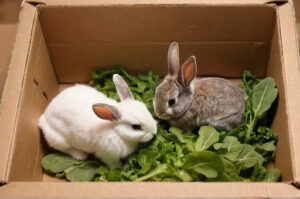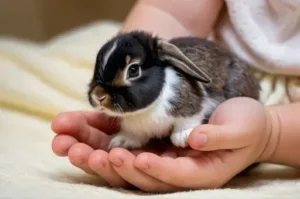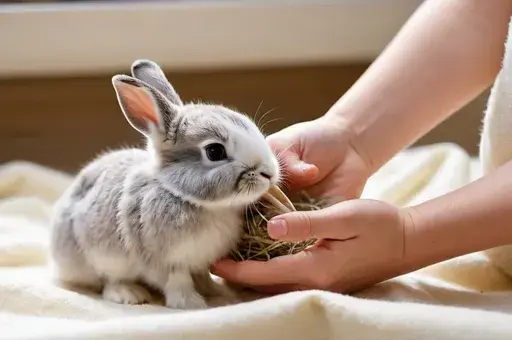Finding baby rabbits without their mother can be tough and emotional. These little creatures need the right food to survive and grow healthy. This guide will help you know what to feed baby rabbits who don’t have their mom, giving you the confidence to take care of them properly. Whether you’re a pet owner, a wildlife helper, or someone who found orphaned bunnies, this article will help you support their growth and well-being.
Understanding the Nutritional Needs of Baby Rabbits
Baby rabbits, or kits, need special food to grow strong and healthy. In the wild, their mom’s milk gives them the perfect mix of nutrients. The first few weeks of life are crucial because their digestive system and immune systems are still developing. Knowing what nutrients baby rabbits need will help you take good care of them.
Mom’s milk has all the right stuff: proteins, fats, vitamins, and minerals. These nutrients help the kits grow and protect them from getting sick. If you’re feeding orphaned kits, try to give them food that’s as close to their mom’s milk as possible. They need things like calcium and vitamins to grow strong bones and stay healthy.
As they get older, baby rabbits will start eating solid foods. This change needs to be done carefully to make sure they still get all the nutrients they need. Good nutrition from the start helps them grow up healthy and strong.
Immediate Actions When Finding Orphaned Baby Rabbits
When you find baby rabbits without their mother, you need to act quickly. First, check their age by looking at their fur, eyes, and how they move. Newborn rabbits don’t have fur and their eyes are closed. Older kits have fur, and open eyes, and might be more active.

Your first job is to keep them warm because baby rabbits can’t keep themselves warm. Use a soft towel or blanket and put a heating pad on low under half of their space. This way, they can move to a cooler spot if they get too warm.
Make sure their environment is safe and clean. Use a small box or animal carrier with soft bedding. If they look dehydrated, give them a few drops of water with a syringe or dropper, but be careful not to make them choke. Once they are warm and safe, you can start focusing on feeding them.
What to Feed Baby Rabbits Without a Mother? Suitable Replacements for Mother’s Milk
Feeding orphaned baby rabbits means finding the right milk replacement. There are special commercial rabbit milk replacers you can buy. These are made to have all the nutrients baby rabbits need. They are the best choice because they’re designed for baby rabbits.
If you can’t find commercial milk replacers, you can make a homemade formula. One recipe uses goat’s milk and a pinch of acidophilus powder to help their digestion. Another option is mixing evaporated milk, water, and a little egg yolk. Only use homemade formulas until you can get a commercial replacer.
Make sure any formula you give them is warmed to body temperature. The cold formula can cause problems for their tiny bodies. Keep the prepared formula in the fridge and throw away any leftovers after 24 hours to avoid bacteria growth.
Feeding Schedule and Techniques
Setting a feeding schedule is super important for baby rabbits. How often and how much you feed them depends on their age. Newborns need feeding every 2-3 hours, while older kits can go a bit longer between feedings.
Use a small syringe or a special feeding bottle to give the milk replacer. Hold the rabbit upright or at a slight angle to prevent choking. Gently put the syringe or bottle nipple into the side of their mouth and let them suckle at their own pace.
As they grow, you can feed them less often. By 2-3 weeks old, they can be fed every 4-6 hours. Keep track of their weight and growth to make sure they’re developing well. Slowly increase the amount of milk replacer as they grow, but don’t overfeed them.
Cleanliness is very important during feeding. Wash your hands before handling the kits and sterilize feeding equipment after each use. This helps keep them healthy.
Introducing Solid Foods
Around 3-4 weeks old, baby rabbits can start trying solid foods. This needs to be done slowly to avoid upsetting their tummies. Start with small amounts of fresh hay, like timothy or alfalfa, which is good for their digestion.

Once they’re used to hay, give them high-quality rabbit pellets made for young rabbits. These pellets have more protein and calcium, which they need to grow. Offer a little at a time along with their milk replacer.
After they’re comfortable with hay and pellets, you can add fresh greens like romaine lettuce, parsley, and carrot tops. Add new foods one at a time and watch for any tummy troubles.
Keep giving them milk replacer until they’re fully weaned at about 6-8 weeks old. Slowly reduce milk feedings as they eat more solid foods. Make sure they always have fresh water to drink.
Hydration and Supplements
Keeping baby rabbits hydrated is very important. Besides milk replacer, they need fresh, clean water all the time. As they start eating solid foods, they’ll drink more water naturally.
Sometimes, they might need extra vitamins and minerals, especially if they’re not growing well. Always ask a vet before giving any supplements to make sure it’s safe. Giving too many supplements can be harmful.
Probiotics can help if the kits have tummy troubles. These good bacteria help with digestion and keeping their tummies healthy. You can add probiotics to their milk replacer or give them separately, as advised by the vet.
Watch the kits to make sure they’re not dehydrated. Check their skin and how moist their mouth and eyes are. If they seem dehydrated, take action quickly because it can be dangerous.
Monitoring Health and Growth
Keeping track of the health and growth of baby rabbits is key to making sure they’re doing well. Weigh them regularly to see if they’re growing steadily. A regular increase in weight means they’re getting enough food.
Look out for common health problems like diarrhea, bloating, tiredness, and not eating. These can mean they have digestive issues or infections. If you see these signs, take them to a vet right away.
Check their fur and skin for any signs of parasites or infections. Keep their living area clean to lower the risk of sickness. Always wash your hands before and after handling the kits to prevent spreading germs.
Regular vet check-ups are a good idea to make sure they’re healthy. A vet can give vaccinations, deworming, and other preventive care. Catching health issues early can make a big difference.
If you want to know how long do rabbits live at home? click here.
Social and Emotional Care
Baby rabbits need more than just physical care; they need social and emotional support too. Rabbits are social animals and like being with others. Spend time gently handling and playing with them to help them get used to people.
Create a safe and fun environment for them. Give them toys, hiding places, and soft bedding to explore and play. This helps them learn and reduces stress.
If you can, introduce them to other rabbits when they’re older. Being around other rabbits is important for their social development and helps prevent behavior problems. Supervised time with other rabbits teaches them social skills and gives them friends.
At first, don’t handle the kits too much to avoid stressing them out. Slowly increase the time you spend with them as they get used to it. Providing a stable, loving environment is key to their happiness and health.
Conclusion
Taking care of orphaned baby rabbits is a big but rewarding job. They need the right food, hydration, and regular monitoring to grow healthy. By understanding their needs, providing the right milk replacers, introducing solid foods at the right time, and caring for their social and emotional well-being, you can help these little ones thrive. Always seek vet advice when needed and remember that your care can make a huge difference in their lives.
Additional Resources
For more help with caring for orphaned baby rabbits, check out these resources:
- House Rabbit Society
- Rabbit Care Tips
- Recommended books: “The House Rabbit Handbook” by Marinell Harriman and “Rabbit Health in the 21st Century” by Kathy Smith
- Local wildlife rehabilitation centers and vets specialize in small animals
Using these resources and the information in this article, you can make sure orphaned baby rabbits get the care they need to grow strong and healthy.

